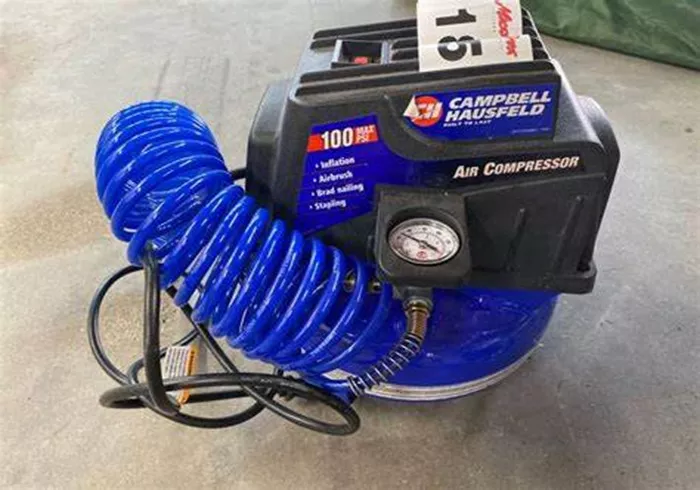Air compressors are essential tools in many industries and DIY projects. They power tools, inflate tires, and even clean surfaces. But with so many options available, it can be hard to know which one is right for you. One common question is: Is a 100 PSI air compressor good?
In this blog post, we’ll explore everything you need to know about 100 PSI air compressors. We’ll cover their performance, uses, advantages, and limitations. By the end, you’ll have a clear understanding of whether a 100 PSI air compressor is the right choice for your needs.
What Does 100 PSI Mean?
PSI stands for Pounds per Square Inch. It measures the amount of pressure an air compressor can generate. A 100 PSI air compressor can deliver air at a pressure of 100 pounds per square inch.
This level of pressure is suitable for many tasks, but it’s important to understand what it can and cannot do. Let’s break it down further.
Common Uses of a 100 PSI Air Compressor
A 100 PSI air compressor is versatile and can handle a variety of tasks.
Here are some common uses:
1. Powering Air Tools
Many air tools, such as nail guns, impact wrenches, and paint sprayers, require a PSI range of 70 to 100. A 100 PSI air compressor is perfect for these tools.
2. Inflating Tires
Whether it’s car tires, bike tires, or sports equipment, a 100 PSI air compressor can easily inflate them to the recommended pressure.
3. Cleaning Surfaces
A 100 PSI air compressor can be used with a blowgun attachment to clean dust and debris from surfaces, tools, and hard-to-reach areas.
4. DIY Projects
For home improvement tasks like stapling, nailing, or painting, a 100 PSI air compressor is a reliable choice.
5. Industrial Applications
In workshops and small-scale industrial settings, a 100 PSI air compressor can power machinery and equipment efficiently.
Advantages of a 100 PSI Air Compressor
A 100 PSI air compressor offers several benefits that make it a popular choice for many users.
1. Versatility
With 100 PSI, you can handle a wide range of tasks, from inflating tires to powering tools.
2. Portability
Many 100 PSI air compressors are compact and lightweight, making them easy to move around.
3. Affordability
Compared to higher PSI models, 100 PSI air compressors are often more budget-friendly.
4. Energy Efficiency
A 100 PSI air compressor typically consumes less power than higher-pressure models, saving you money on energy bills.
5. Ease of Use
These compressors are generally user-friendly, making them ideal for beginners and professionals alike.
Limitations of a 100 PSI Air Compressor
While a 100 PSI air compressor is versatile, it does have some limitations.
1. Not Suitable for Heavy-Duty Tasks
Tasks that require higher pressure, such as sandblasting or operating heavy machinery, may need a compressor with a higher PSI rating.
2. Limited CFM Output
CFM (Cubic Feet per Minute) measures the airflow. Some 100 PSI compressors may have lower CFM, which can limit their effectiveness for continuous use.
3. Tank Size Matters
Smaller tanks may require frequent refilling, which can interrupt your work.
How to Choose the Right 100 PSI Air Compressor
If you’ve decided that a 100 PSI air compressor is right for you, here are some factors to consider before making a purchase.
1. Tank Size
Choose a tank size based on your needs. Larger tanks are better for continuous use, while smaller tanks are more portable.
2. CFM Rating
Ensure the CFM rating matches the requirements of your tools or tasks.
3. Portability
If you need to move the compressor frequently, opt for a lightweight and compact model.
4. Noise Level
Some compressors can be noisy. Look for models with noise-reducing features if this is a concern.
5. Durability
Invest in a compressor made from high-quality materials to ensure it lasts for years.
Maintenance Tips for a 100 PSI Air Compressor
Proper maintenance can extend the life of your air compressor and keep it running efficiently.
1. Regularly Check Oil Levels
If your compressor is oil-lubricated, ensure the oil is at the recommended level and change it as needed.
2. Drain the Tank
Moisture can accumulate in the tank over time. Drain it regularly to prevent rust and damage.
3. Inspect Hoses and Connections
Check for leaks or wear and tear in hoses and connections. Replace them if necessary.
4. Clean Air Filters
Dirty air filters can reduce efficiency. Clean or replace them regularly.
5. Store Properly
When not in use, store the compressor in a clean, dry place to prevent damage.
Conclusion
A 100 PSI air compressor is a versatile and reliable tool for many tasks, from DIY projects to industrial applications. It’s affordable, energy-efficient, and easy to use, making it a great choice for beginners and professionals alike.
However, it’s important to consider your specific needs. If you require higher pressure or continuous use, you may need a compressor with a higher PSI or CFM rating.
By understanding the capabilities and limitations of a 100 PSI air compressor, you can make an informed decision and choose the right tool for your needs.

